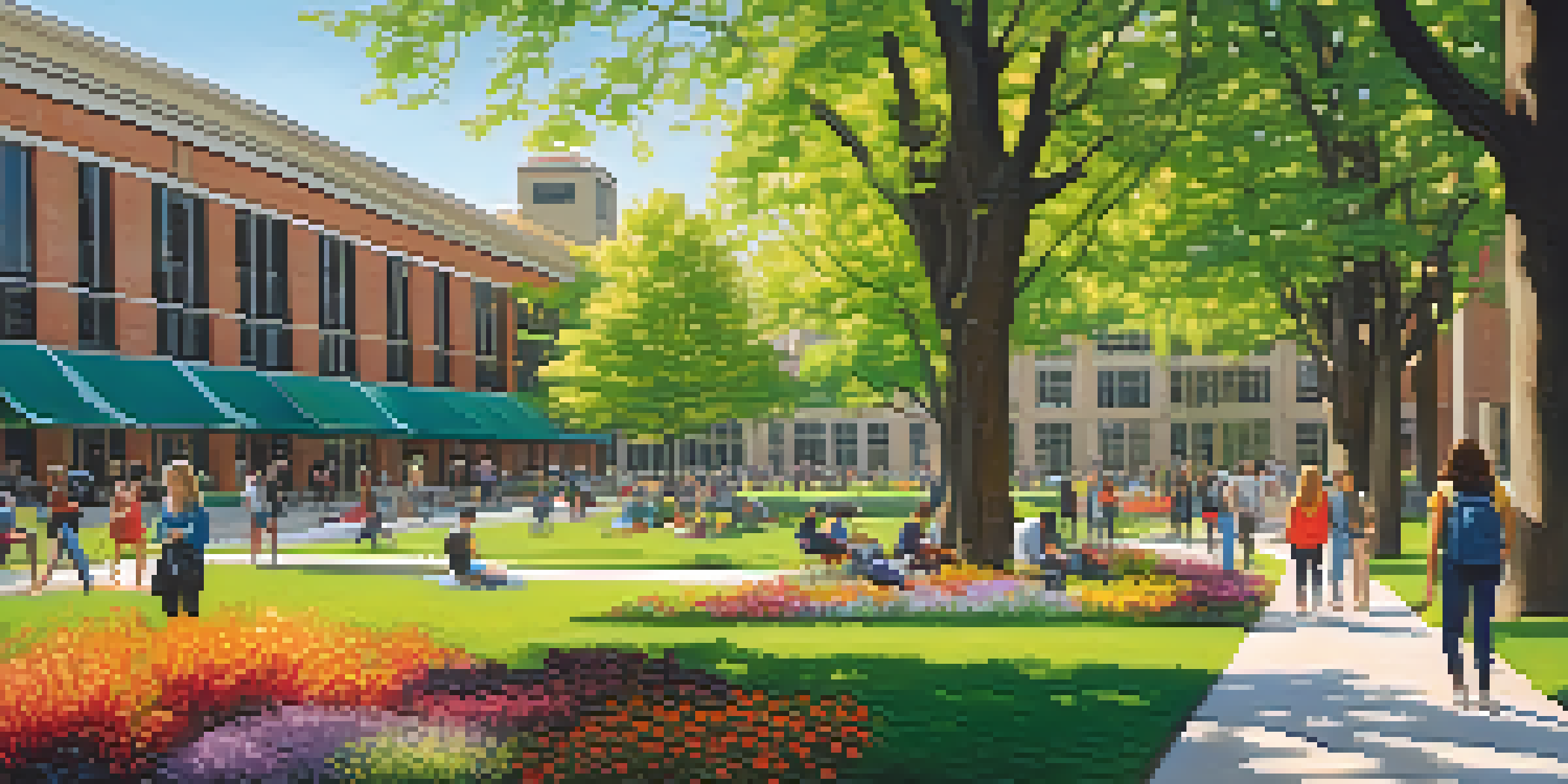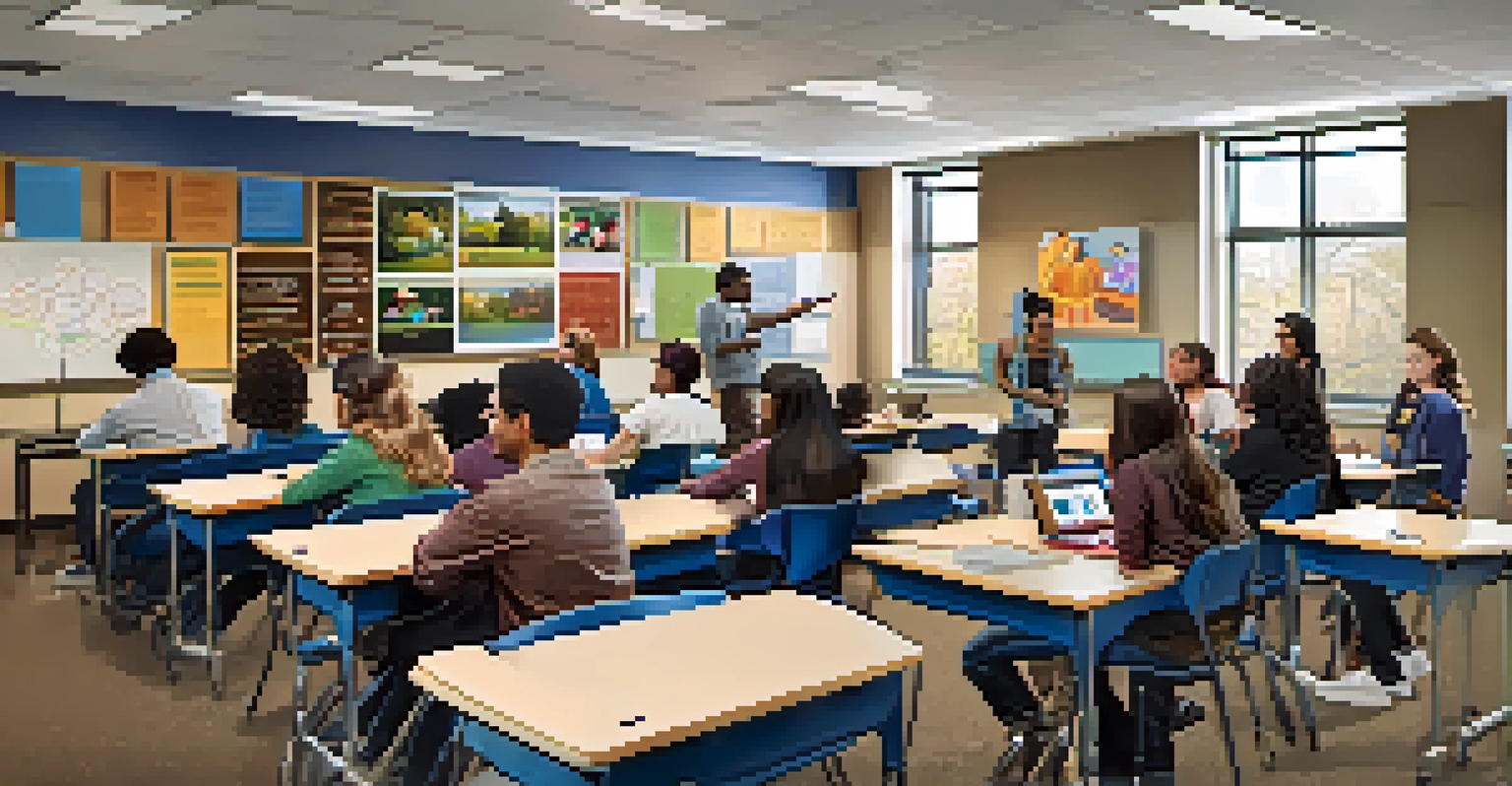Detroit's Higher Education Institutions and Industry Connections

Overview of Higher Education in Detroit
Detroit is home to a diverse range of higher education institutions, including universities, colleges, and community colleges. These institutions not only provide education but also play a pivotal role in the city's economic landscape. By offering various programs and degrees, they prepare students for a competitive job market and address the skills gap in local industries.
Education is the most powerful weapon which you can use to change the world.
Among the key players are Wayne State University, the University of Detroit Mercy, and Oakland University, each contributing unique strengths to the educational ecosystem. These schools offer programs in fields such as engineering, business, and healthcare, aligning closely with the needs of industries in the region. This synergy fosters a vibrant learning environment that encourages innovation and collaboration.
Moreover, these institutions are not just about academics; they engage in community service and outreach initiatives. They often partner with local businesses, creating a pipeline for internships and job placements that benefit both students and employers. This interconnectedness helps to build a robust workforce ready to tackle the challenges of tomorrow.
Key Institutions Shaping Detroit's Workforce
Some of the most influential institutions shaping Detroit's workforce include Wayne State University, which boasts a comprehensive range of graduate and undergraduate programs. With a strong focus on research and community engagement, Wayne State plays a vital role in fostering innovation in the region. Its emphasis on real-world experience equips students with the skills needed to thrive in their careers.

The University of Detroit Mercy, with its commitment to liberal arts education, prepares students for a variety of fields, including education, law, and health sciences. Its unique approach encourages critical thinking and ethical decision-making, essential qualities in today’s job market. As a result, graduates are not only ready to enter the workforce but also to contribute meaningfully to their communities.
Detroit's Education Drives Workforce
Higher education institutions in Detroit play a crucial role in preparing students for the job market and addressing local industry needs.
Additionally, local community colleges, such as Wayne County Community College District, provide accessible education and vocational training. They offer tailored programs that meet specific industry needs, ensuring that students acquire relevant skills. This focus on practical training helps bridge the gap between education and employment, making a significant impact on the local economy.
Industry Partnerships and Collaborations
Partnerships between higher education institutions and local industries are a vital component of Detroit's economic development. These collaborations often result in joint research projects, internships, and job placement programs that benefit students and employers alike. For example, many universities have established advisory boards comprising industry leaders to ensure their curricula remain relevant and impactful.
An investment in knowledge pays the best interest.
One notable partnership is between the University of Michigan and the automotive industry, which has historically been a cornerstone of Detroit's economy. This collaboration has led to significant advancements in automotive engineering and technology, preparing students for careers in a rapidly evolving field. Such alliances not only enhance educational offerings but also drive innovation in local industries.
Moreover, these partnerships extend to other sectors, including healthcare and technology. Institutions often collaborate with hospitals and tech companies to provide students with hands-on experience and networking opportunities. These connections are invaluable for students as they transition from the classroom to the workplace.
Impact of Research and Innovation
Research initiatives at Detroit's higher education institutions significantly contribute to local innovation. Universities like Wayne State and the University of Michigan are known for their cutting-edge research in various fields, including engineering, medicine, and social sciences. This research not only elevates the academic reputation of these institutions but also drives economic growth by attracting investment and talent to the region.
For instance, Wayne State's research in urban health has led to innovative solutions for public health challenges in the city. By collaborating with local healthcare providers, the university addresses pressing issues while providing students with valuable research experience. Such initiatives highlight the role of academia in tackling real-world problems and fostering community well-being.
Strong Industry Partnerships Thrive
Collaborations between universities and local industries enhance educational offerings and provide valuable real-world experiences for students.
Additionally, innovation hubs and incubators affiliated with these institutions support startups and emerging businesses. These centers provide resources, mentorship, and funding opportunities, helping entrepreneurs turn their ideas into successful ventures. This nurturing environment enhances the entrepreneurial spirit in Detroit, making it a vibrant place for innovation.
The Role of Community Engagement
Community engagement is a cornerstone of many higher education institutions in Detroit. They actively seek to connect with local residents, businesses, and organizations to make a positive impact on the community. Initiatives range from service-learning projects to outreach programs aimed at improving education and health in underserved areas.
For example, students from the University of Detroit Mercy often volunteer in local schools and community centers, applying their skills in real-world settings while giving back to the community. This hands-on experience not only enriches their education but also fosters a sense of responsibility and civic engagement. Such involvement strengthens the bond between the university and the community.
Moreover, these institutions frequently host public events, workshops, and seminars that are open to the community. These activities provide valuable resources and knowledge, empowering local residents and fostering a culture of lifelong learning. By bridging the gap between academia and the community, Detroit's higher education institutions play an essential role in building a stronger, more connected city.
Preparing Students for the Future
As the job market continues to evolve, higher education institutions in Detroit are focused on preparing students for future challenges. They are increasingly emphasizing skills such as critical thinking, problem-solving, and adaptability—qualities that are essential in a rapidly changing world. By integrating these skills into their curricula, universities equip students to thrive in diverse professional environments.
Additionally, many institutions are expanding their offerings in emerging fields like data science, cybersecurity, and renewable energy. Recognizing the demand for these skills, they are developing programs that not only meet industry needs but also inspire innovation. This forward-thinking approach ensures that graduates remain competitive and relevant in the job market.
Focus on Innovation and Research
Research initiatives at Detroit's universities foster local innovation and economic growth while addressing community challenges.
Collaboration with industry leaders also plays a crucial role in preparing students for the future. By involving employers in curriculum development and providing internships, these institutions create pathways for students to gain practical experience. This alignment between education and industry needs is vital for fostering a workforce that can meet the challenges of tomorrow.
The Future of Higher Education in Detroit
Looking ahead, the future of higher education in Detroit appears promising, with continued growth and adaptation to industry demands. As the economy evolves, institutions are likely to expand their programs and partnerships to better serve students and the community. This adaptability is crucial for maintaining relevance in an increasingly competitive landscape.
Moreover, advancements in technology are transforming the way education is delivered. Online learning, hybrid models, and innovative teaching methods are becoming more prevalent, making education more accessible to a wider audience. This shift opens up new opportunities for non-traditional students and working professionals seeking to upskill or change careers.

Finally, the ongoing collaboration between higher education institutions and local industries will remain essential in shaping the future. By working together, they can address workforce challenges and drive innovation, ensuring that Detroit continues to thrive as a hub of education and industry. The synergy between academia and the economy will be key to fostering a prosperous future for the city.